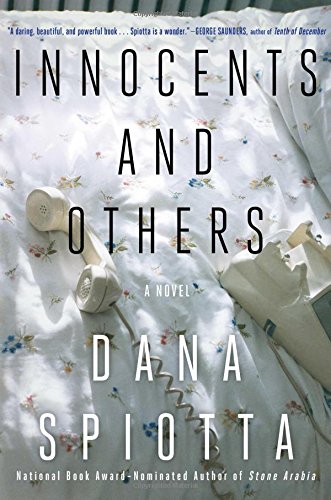
Dana Spiotta’s new novel, Innocents and Others, pays homage to an early form of hacking known as “phone phreaking.” Phone phreaks would break into long-distance networks by learning the language of the telephone. With their mouths, or sometimes with whistles from Cap’n Crunch cereal boxes, phreaks mimicked the tonal frequencies and sequences that would trigger network switches. They made pitch-perfect 2600 Hz shrieks into headsets, resetting the trunk lines that would allow toll-free access to virtually anywhere. Their whistles and clicks forced phone companies to develop separate channels for carrying routing info. Their hacks began the encrypting process that has led to the recent standoff between Apple and the FBI.
But Spiotta doesn’t go there. Innocents and Others is not a parable of “disruption,” nor are Spiotta’s phone phreaks the antecedents of brogrammers. Her characters phreak for love. They don’t want to exploit the system or bypass the operator. They want to find the operator. Specifically, the character known as “Jelly” wants to reach something called an “inward operator:” “People who can connect you to wherever you want to go; they are deep in the machine…they were voices, humans, somewhere in the big wide world.”
Both of the main storylines of Innocents and Others feature women influencing Hollywood from somewhere in said big wide world, specifically from Upstate New York. There’s the story of Meadow and Carrie, longtime friends who become filmmakers and slowly drift apart, and the story of Jelly, former girlfriend of a pioneer phone phreak and a proto-catfisher with a heart of gold. From a darkened room in Solvay, an economically-depressed suburb of Syracuse, Jelly cold-calls Hollywood producers and seduces them over the phone. She becomes legendary and eventually attracts the attention of Meadow, who has moved from Los Angeles to Gloversville to make artsy documentaries that feed the late-20th-century desire for confession.
A novel about this kind of urge to find the human deep in the machine is to be expected, considering our current fascination with analog technologies, with the kind of reaching out and touching others that involves the vibration of tone sequences through wires and hands along switchboards. Spiotta’s treatment of this desire is the next chapter in her career-long flirtation with nostalgia, but the nostalgia of Innocents and Others is less escapist, more radical, than other recent homages to the pre-encrypted world.
 For example, Rachel Kushner’s The Flamethrowers (2013) turns to the art world that sprung up in the abandoned factories of SoHo in the 1970s. The novel’s masterful representation of this world participates in a recent obsession with all things New York in the 1970s, an obsession Edmund White describes in his New York Times Style Magazine essay, “Why Can’t We Stop Talking About New York in the Late 1970s?” Innocents and Others, on the other hand, does not promote longing for a super-cool era that has passed. Instead, it expresses a ruminative living with loss and longing that nurtures the kind of fellow feeling from which solidarity and renewal can grow.
For example, Rachel Kushner’s The Flamethrowers (2013) turns to the art world that sprung up in the abandoned factories of SoHo in the 1970s. The novel’s masterful representation of this world participates in a recent obsession with all things New York in the 1970s, an obsession Edmund White describes in his New York Times Style Magazine essay, “Why Can’t We Stop Talking About New York in the Late 1970s?” Innocents and Others, on the other hand, does not promote longing for a super-cool era that has passed. Instead, it expresses a ruminative living with loss and longing that nurtures the kind of fellow feeling from which solidarity and renewal can grow.
The inward operators of The Flamethrowers are “China Girls,” office workers whose faces are filmed (usually alongside a color chart) and spliced onto the initial frames of film reels. Though the origin of the name “China Girl” is a bit of a mystery, their purpose is pretty straightforward: film processors used their images to calibrate color densities. In the Paris Review, Kushner says this about fascination with China Girls:
If the projectionist loaded the film correctly, you didn’t see the China girl. And if you did see her, she flashed by so quickly she was only a quick blur. They were ubiquitous and yet invisible, a thing in the margin that was central to each film, these nameless women that, as legend has it, were traded among film technicians and projectionists like baseball cards.
The China Girl does for film processing what the inward operator does for the analog telephone network. She is the requisite drop of humanity that calibrates machines that carry approximations of humanity. The China Girl highlights the role of anonymous workingwomen in the evolution of American culture. She gives us a new way of looking at what is already at the center of culture (movies). She is a reminder that if we look closely enough at, say, a length of film, we will find women trapped into standards.
Where Kushner’s China Girls represent the objectified women at the center of culture, Spiotta’s inward operators represent the radical possibilities that sound along the periphery. The voices of inward operators decentralize Jelly’s world. They signify its incredible depth and breadth. Most importantly, they carry the promise of intimate connection in a world where the means of connection are about to be encrypted. Unlike Kushner’s framed and fetishized women, Spiotta’s live beyond the reach of the subjugating dream factory. They continue to operate freely, triggering switches at the center of power — Meadow with her movies and Jelly with her phone calls.
And this interest in the radical potential of the periphery comes, I think, from the fact that Dana Spiotta has been living in Upstate New York for quite a while. Unlike such Silent-Generation writers as William Kennedy, Joyce Carol Oates, Russell Banks, or Richard Russo, whose novels preserve Upstate village life in the amber of literary realism, Spiotta understands Upstate as the living ground of revolution. It’s home to the Erie Canal, which Spiotta has called “the Internet of the nineteenth century.” It’s ground zero of the Women’s Movement, radical fundamentalist Christianity, and the back-to-the-land movement. It’s where people go change the world, not where they go to escape from it.
 Meadow, who fled L.A. for Upstate, is a master dissimulator who avoids being exploited, ignored, or fetishized. She makes jury-prize-winning documentaries that eventually earn her an Errol-Morris-but-in-a-bad-way rep, which spoils her chances at a long career (only one Oscar nod). She winds up living austerely Upstate — think Nicholas Ray circa We Can’t Go Home Again (1973) minus the posse. Her friend Carrie writes empowered-woman rom-coms and pretty much lives happily ever after.
Meadow, who fled L.A. for Upstate, is a master dissimulator who avoids being exploited, ignored, or fetishized. She makes jury-prize-winning documentaries that eventually earn her an Errol-Morris-but-in-a-bad-way rep, which spoils her chances at a long career (only one Oscar nod). She winds up living austerely Upstate — think Nicholas Ray circa We Can’t Go Home Again (1973) minus the posse. Her friend Carrie writes empowered-woman rom-coms and pretty much lives happily ever after.
Where Meadow is the alluring, complicated trickster that we hope to find in literary fiction, Jelly is unprecedented, a woman once seduced by a giant, bald, blind-from-birth, alpha phone phreak (Oz) who names her Jelly Doughnut because “she was soft and round and even sweeter on the inside.” Where Meadow maintains the magnetism of an edgy art student who only dates sultry, eyelinered boys, Jelly is never not assertively middle-aged, unattractive, and drawn to ugliness. Granted, Spiotta gives Jelly the more fulfilling sex life. But she has to earn it. Her sensuality is in part a result of a meningitis infection that caused her to lose her sight, which increased her interest in smell and sound. (It’s also the illness that brought her and Oz together.) For Jelly, there are no “good” or “bad” smells, only “real” or “cover” ones. “And she wanted everything to smell as it was. Actually. An armpit should smell of sweat and hair and skin.” Her sight eventually recovers, but her interest in feeling around for what is actual never subsides.
Her relationship with Oz is intense, very haptic, very sexual. He teaches her how to whistle the phone into submission. Oz’s favorite thing about phreaking is reaching an electronic switching station, where he can click and whistle at crossbar and Strowger switches. Jelly’s favorite thing, other than reaching an inward operator, is reaching an “open-sleeve circuit,” a kind of proto-chat room:
Their voices hanging in space, listening and laughing and recognizing each other. She was the only — the only — woman who phone phreaked. These were shy, awkward men. They gave her lots of attention, which she enjoyed, but they were never ever nasty.
But her real passion, her art, is listening. After a friend who cleans houses steals some rolodex numbers from a mansion on Mulholland Drive, Jelly starts calling Hollywood players, “not the really famous ones…the names you don’t know.” Developing a language that does for human connection what 2600 Hz whistles do for trunk lines, Jelly triggers the switches of anonymous, powerful men.
With strategically-deployed pauses and vocalizations, circumlocutionary skills that would impress even J.L. Austin, Jelly extracts intimacy from men who are otherwise dead inside. They have money and power, but it’s Hollywood power, which is to say that it’s the kind of empty compensation that leaves a man vulnerable to an anonymous, willing female ear. Jelly is an intimacy hacker, her pauses and “wordlets” keep men confessing not their crimes or dubious morals so much as their genuine impressions of what life feels like — impressions that can be delivered over the telephone.
 Spiotta’s characters want to feel the weight of self and find that the best way to do so is to submit to the precarious tissue of intimate connection, connection that is not routed along encrypted networks or filtered through predictive analytics. Desire for such connection is what draws Denise Kranis, protagonist of Stone Arabia (2011), into the kitchen of the stranger whose sad story Denise had followed instead of attending to her own life. Stone Arabia is a novel about how we compensate for failures to connect, about how we craft the covers of our not-real lives.
Spiotta’s characters want to feel the weight of self and find that the best way to do so is to submit to the precarious tissue of intimate connection, connection that is not routed along encrypted networks or filtered through predictive analytics. Desire for such connection is what draws Denise Kranis, protagonist of Stone Arabia (2011), into the kitchen of the stranger whose sad story Denise had followed instead of attending to her own life. Stone Arabia is a novel about how we compensate for failures to connect, about how we craft the covers of our not-real lives.
Innocents and Others is a novel about how intimacy works best from a distance. As is made painfully clear when Meadow coaxes Jelly into the light, direct encounter tends to dissolve what remains of the means of connection. Jelly is all but ruined, China-Girled by Meadow’s movie. This coming together of the novel’s two plots is the least compelling aspect of Innocents and Others. Its nod to narrative unity is forced, but the best part about the nod is how convincingly it suggests that we were all better off talking to each other in the dark.








